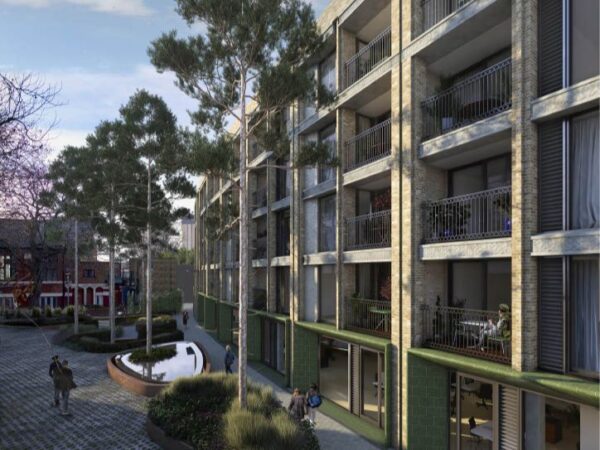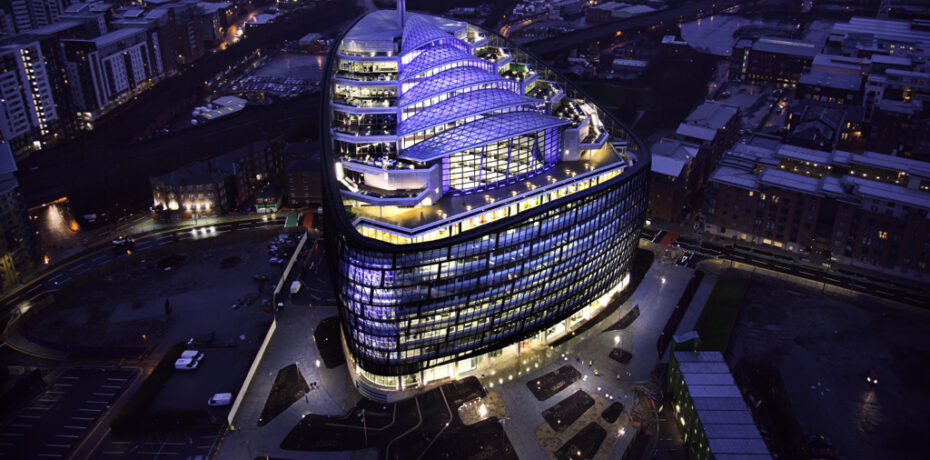The Subplot
The Subplot | Fred Done’s adventure, empty towns, fallen angels
Welcome to The Subplot, your regular slice of commentary on the North West business and property market from Place North West.
THIS WEEK
- Capital gamble: Fred Done’s Salboy embarks on a £1bn London adventure
- Heavenly prospect: the £210m Angel Square deal you need to watch
- Way to go: city centres are recovering slowly, Blackpool romps back to life

CAPITAL GAMBLE
 Fred Done’s £1bn punt on London
Fred Done’s £1bn punt on London
Fred Done-backed residential developer Salboy acquired a tiny Chelsea site and plans 35 new-build apartments, pictured. The £40m scheme is the first instalment of a £1bn+ London adventure, and there’s an important message for the North West.
Salboy, the Done-backed vehicle co-founded and piloted by Simon Ismail, has acquired a plot in fashionable Chelsea, SW3. Without boasting, at 0.67 acres the site is appreciably smaller than Subplot’s garden, but this is London so the eventual development value of the build-for-sale apartment scheme will be an outsized £40m. The scheme is a sign of what’s to come as the Done bookmaking property millions benefit from a sharpened focus.
We heart IRR
The big picture is this: like any self-respecting multi-millionaire bookie in an era of cheap debt and inflation risk, Done and Ismail are all about the internal rate of return. The prospects are probably slowing in the crowded Manchester residential scene but, after a lull, appear to be be picking up again in London. The capital is expected to enjoy a post-pandemic boost, particularly from South East Asia (think fleeing Hong Kong residents), and it is always better to get ahead of the pack. So Done swerves to London.
Billions in play
Ismail says Salboy is looking at three further London sites with a view to rapid action: at least one of them is big, with the potential for a £500m scheme. The total development value of the emerging portfolio will be well in excess of £1bn, he says. Salboy is also believed to be pondering options in Bristol and Newquay as the business spreads its bets in fast-growing, tightly-defined markets. Also, note that this is development at the more luxurious end of the spectrum.
Local options
Done and Ismail are not abandoning Manchester, just widening their scope. In 2020 Salboy completed six major developments across Manchester and Salford delivering more than 1,300 homes. Current on-site projects include Castle Irwell, a new urban village of 500 homes set around a three-acre park, and Viadux, a 40-storey residential tower. But there is a definite sense of a business in transition.
Widening appeal
“I wouldn’t say Manchester will plateau but it will be interesting to see what happens. The signals are it will continue to grow, thanks to the tech sector and the student population, but we are going into London because we want to be a more countrywide-developer, and we want growth,” says Ismail.
More follows
The creation of an in-house construction business has made the decision to commit to London a lot easier. Why invest in other folks’ London schemes – the strategy until now – when you could do it yourself, and sweep up everybody’s margin with much less risk? Thoughts like that have been going through Ismail’s head. “We see London as a key part of our future strategy,” says Ismail. Salboy’s first foray certainly won’t be the last.
DRIVING THE WEEK
The £210m megadeal that will set the tone in Q3
Keep your eyes open for this autumn’s sale of the Co-op’s HQ at One Angel Square, Manchester. Will it be part of a North West investment market bounce-back after a slow Q3?
Agents have yet to be appointed to handle the sale of the Co-op’s 329,000 sq ft HQ but by September the £210m disposal should be in full swing. It’s a great moment to test the market and grab a fruity profit: RREEF Real Estate, part of Deutsche Bank, together with Chinese state-backed fund Gingko Tree Investment, acquired the block for £142m in 2013. The yield back then was 6%, and it’ll be very much sharper this time. Think 4% and take a deep breath.
Size matters
This is a chunky lot for Manchester: M&G Real Estate’s 2014 purchase of the RBS Spinningfields portfolio for £320m is still unbeaten. But given that this time last year it wasn’t clear the office market had a long-term future, it’s a massive sign of regained investor confidence. “It’s a recovery in understanding, from both vendors and buyers. Everyone can now see more clearly what Covid is, and they are now plotting recovery,” says Dan Crossley, principal at Avison Young.
FOMO
The much-discussed “wall of money” is real, albeit a bit picky in some respects, and anxious to spend before prices go up even further or their rivals grab the good stuff. Proof came a few weeks ago with a final triumphant “on” to the on-again-off-again £143m sale of Three and Four Piccadilly Place, Manchester. A joint venture between Longmead Capital and Revcap acquired the 320,000 sq ft Manchester office scheme from Ares after a 15-month pause blamed on the pandemic.
Normcore
The Longmead/Revcap buy is significant because there’s really not much of an asset management play here – okay, you could push rents on a bit – but this is good new quality space, with no obvious refurbishment or redevelopment angles. That it sold is a testament to faith in the continued future of white-bread office assets.
Fixer-upper
The same is true, with knobs on, in the fixer-upper market. Take a stroll down Peter Street to see the changed mood. Investors might have taken fright at Free Trade Exchange, the 36,000 sq ft office block. The prospect of spending on an upgrade might have nixed buyer’s maths. Clearbell clearly thought not: it is said to have paid around £300/sq ft, appreciably more than the reputed asking price of £230/sq ft. This time last year investors were all about easy wins, but today they are prepared to do some work and add value.
We heart sheds
Once you’re done with Peter Street, leap on a number 17 and head to Rochdale, where you’ll find a red hot industrial property market. Two weeks ago NFU Mutual paid a good deal more than the £27m asking price for the 216,000 sq ft Amazon unit at Kingsway Business Park. The yield is said to have been 3.75% which is so hot it hurts.
Blighted no more
There was a time, not so long ago, when investors would have given this Rochdale shed a wide berth. Aberdeen Standard Life built the thing in 2016 and it has been empty ever since. The thought in their heads would have been ‘what’s wrong’ and they would have steered clear. Today, the occupier market is so hot nobody is much bothered. Sooner or later everything lets, and lets well, as the Rochdale unit shows.
Regional feelings
The same expansive attitude is helping shed sales in Merseyside and south Cheshire. “The wall of money has changed the way investors are thinking. They now see it as a North West industrial market, a much broader scene than it used to be – and they are happy to back deals away from the prime spots because that’s where occupiers can find the workforce they need. Basically, the funds are adapting,” says Roberts Woods, CBRE. Land prices are rocketing and as a result £750,000 an acre no longer feels like madness. Buyers trying to secure off-market deals on standing assets are budgeting for a 10-20% uplift on book values.
Yes, shops
There are complexities. For instance, investors will also have to grapple with the realities of their prospective tenant’s businesses in a way that, until now, they have largely failed to do. Yes, the Co-op HQ is an office building but it is an office building that houses a retail business. Brutally: the Co-op’s lease on One Angel Square is worth something only if you think the Co-op’s 2,500 stores have a profitable future. So the sale will reflect intelligent investors’ views of the office market and of UK convenience retail (unintelligent investors will not grasp this nuance, and will mis-price).
Autumn leaves
Where does this end? The received wisdom is that investors gorged themselves on the tastiest opportunities in the first half of the year, took the summer off to digest, and will return with renewed appetite in the autumn. Disquiet about the slow pace of recovery in the office lettings market could cause a few rumbles – catch investment brokers off guard and they show real signs of concern – but if the Co-op home moves fast, we’ll have our answer.
IN CASE YOU MISSED IT…
 The non-recovery: new data you won’t like unless you’re in Blackpool
The non-recovery: new data you won’t like unless you’re in Blackpool
Liverpool and Manchester are a long way off normal footfall. Their office markets and daytime economies are still suffering according to glum Centre for Cities data. But all’s well in Blackpool.
Okay, there are a few more people on the North West’s streets than there were four months ago. But don’t let that fool you into thinking there’s a recovery in progress: Centre for Cities tracking data shows there’s a long way to go before anything like viable levels of pedestrian flow are restored. However, there’s better news in the leisure sector, and a lot of cheer for Blackpool, the UK’s top spot for spending and footfall.
Daytime tumbleweed
First, the bad news. Liverpool and Manchester are operating way below capacity, according to July footfall trackers. In Manchester about 17% of pre-lockdown workers are back at their desks in the day, roughly the level it has held all year. Weekend footfall has trended around the high 60%s, surging to 81% towards the end of July (next month’s data will reveal whether it was a sustained leap or a one-off due to sunshine). Manchester’s night-time economy is hovering at about 40% capacity. Centre for Cities reckons this puts the city firmly in the bottom 10 of poor performers. No recovery to see here.
A great night out
Liverpool is doing a little better, thanks to nightlife. After dark footfall has been climbing steadily since the beginning of July, up about 5% a week, and is now 71%, out-pacing Manchester. At this rate of growth, Liverpool will be back to normal by Christmas. Spending is also up on the figures recorded in February 2020, and is enjoying an 18% uplift (although be careful, maybe a normal August ought to be even further up on a normal February?) There’s less joy to be had from the office worker/daytime economy where footfall is trivial – 15% of pre-pandemic levels by the end of July. It has been stuck at this level for 10 months. Liverpool’s weekend economy is a repeat of Manchester’s with footfall peaking at 78%.
London is worse
For comparison, the volume of daytime workers in London is running at just 15% of pre-lockdown levels, only a little better than it managed during the long winter shutdown. Weekend (leisure) footfall is back up to about 60%. The London night-time economy has recovered to about 50% of regular footfall.
Party town
The real star is Blackpool. Footfall and spending put it in the UK’s top spot, way ahead of local rivals and, for that matter, anybody else (although a shout out to Bournemouth, which is doing its best in a soft southern way). Spending is twice that recorded in February 2020, before the first lockdown, and weekend footfall in July was 150% of what it would have been in a rain-lashed February. The same goes for the night-time economy.
The Subplot is brought to you in association with Cratus and Oppidan Life.






I’m sceptical of those poor Manchester footfall figures. I’m in Manchester city centre everyday and it doesn’t feel that quiet. And the night-time economy, particularly at the weekend is incredibly busy.
By Rob C